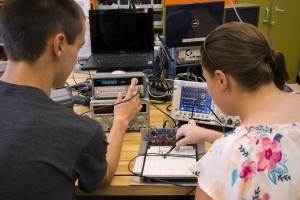Over several years, we engaged in a systematic overhaul of Physics 3330, Electronics for the Physical Sciences (aka J-lab), which is an upper-division required course for all physics and engineering physics majors. The ideas used to guide the changes arose from structured discussions with a large number of faculty members (22) in the context of creating learning goals for the Advanced Lab (PHYS4430), the subsequent transformation work conducted in the Advanced Lab course, our own personal experience teaching the J-lab many times, and our experience with electronics in a research-lab setting. The goals that guided the J-lab transformation included:
- making the experience more authentic and aligned with current practices of experimentalists working with electronics (addressing calls from researchers and national studies in higher education)
- reducing the coursework overload on students and having it more adequately reflect a 2-credit laboratory workload
- including more design and application activities in the guided-lab portion of the course
- better preparing the students for their projects and making them more accountable during this portion of the course.
The outcome objectives for students included:
- developing student expertise with key measurement and design equipment (‘scopes, boards, DMMs, Mathematica, etc.) along with data collection and measurement techniques
- characterizing, modeling, and understanding applications of key core components (discrete RLC components, voltage dividers, operational amplifiers, transistors, etc.)
- developing capacity for theoretical modeling of foundational circuits and comparing theory to experimental measurement
- increasing student satisfaction and engagement.
Course Materials
Instructors who would like to get access to the related course materials for this course should email lewandoh@colorado.edu.



 The Physics Frontiers Centers (PFC) program supports university-based centers and institutes where the collective efforts of a larger group of individuals can enable transformational advances in the most promising research areas. The program is designed to foster major breakthroughs at the intellectual frontiers of physics by providing needed resources such as combinations of talents, skills, disciplines, and/or specialized infrastructure, not usually available to individual investigators or small groups, in an environment in which the collective efforts of the larger group can be shown to be seminal to promoting significant progress in the science and the education of students. PFCs also include creative, substantive activities aimed at enhancing education, broadening participation of traditionally underrepresented groups, and outreach to the scientific community and general public.
The Physics Frontiers Centers (PFC) program supports university-based centers and institutes where the collective efforts of a larger group of individuals can enable transformational advances in the most promising research areas. The program is designed to foster major breakthroughs at the intellectual frontiers of physics by providing needed resources such as combinations of talents, skills, disciplines, and/or specialized infrastructure, not usually available to individual investigators or small groups, in an environment in which the collective efforts of the larger group can be shown to be seminal to promoting significant progress in the science and the education of students. PFCs also include creative, substantive activities aimed at enhancing education, broadening participation of traditionally underrepresented groups, and outreach to the scientific community and general public.